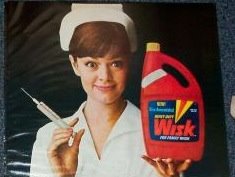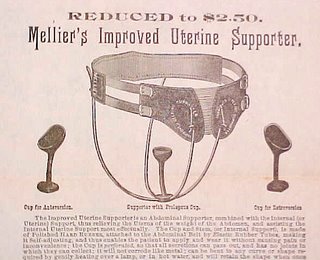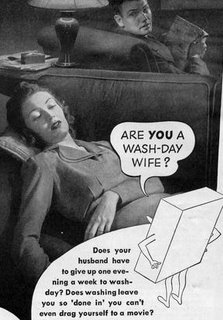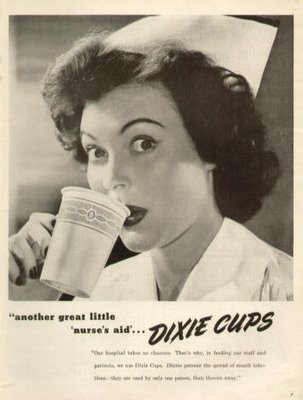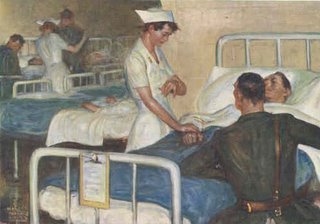The Key To A Smooth Running ER? Nurses!
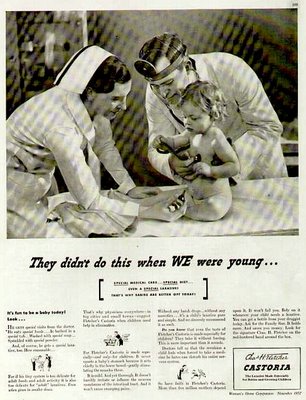 There is a person in this photograph who suffers from a rare, dare I say extinct affliction.
There is a person in this photograph who suffers from a rare, dare I say extinct affliction.
Yes.
It's an actual photo of "Flat Cap Syndrome".
Flat Cap Syndrome developed when the brim of one's nursing cap was larger than the fold behind it.
Some say that the victims were responsible for choosing to go to a School of Nursing identified by those caps.
Don't blame the victim.
Maybe it was the only School that she was accepted to.
Maybe.....maybe she didn't know....
By the time I graduated, designs in nursing caps had pretty much made Flat Cap Syndrome a thing of the past.
My cap was never flat, and to this day it stands proudly in its case in the den closet in pristine condition.
(Disclosure: it's in pristine condition because I just bought it off of eBay.
I have to get the green and gold ribbons on it and then I have to get the courage to wear it to work because my co-workers will have a field day with me.
If all of a sudden there is no more Emergiblog, it's because they killed me with ridicule.
Call the authorities.)
Some of the advantages of working in different facilities are the exposure to different styles of nursing, different opportunities, different patient populations and differing protocols regarding what nurses are able to do on their own.
I'm not talking about using nurses instead of doctors, a la the problems that Dr. Crippen at NHS Blog Doctor describes, I'm talking about protocols that allow nurses, using certain criteria established by the ER physicians, to initiate care prior to the doctor seeing the patient.
It is!
The best ERs that I have worked in are the ones that, per protocol, allow the RNs to do what they do best.
Conversely, the worst ERs I've worked in allowed the nurses to do nothing without an order.
- When I worked at "World Renown Medical Center With Hard To Get Into Medical School", this was the case. The nurses could not make a move without an order.
- Why?
- It was a teaching facility. How could the interns/residents learn to order appropriately if the nurse did it first? And forget verbal orders, if some resident gave an order you grabbed the nearest order sheet and made them write it. So often you'd have five or six different order sheets going.
- Why?
- Because if there was a descrepancy between what was said and what was done, guess whose derriere would be on the line? Right, the nurse's. Remember the old saying about how excrement flows downhill? It's true.
- And the wait to get into a room? Hours. We're talking 5-7 hours at times. You could be vomiting, have a 5-day migraine with photophobia, writhing on the floor with right flank pain secondary to a kidney stone and you would STILL be sitting in the ER with all the feverish, coughing bronchitis patients. And don't think asthma would get you a front row seat, either. If your O2 sat was normal, have a seat like everyone else.
- Why?
- Because the beds never turned over. Because one nurse would be responsible for six monitored patients plus the psych isolation room across the hall. Because....
- ... first the "Pulmonary Team" had to see the patient, then they would decide this was a cardiac problem and you'd wait a few hours for the "Cardiac Team" who would discover that the patient wasn't on that service after all and a different "Team" would come in an hour later, only to discover that said patient couldn't be admitted there anyway, but then the patient would vomit blood which meant that they were too sick to transfer and you had to wait for the "GI Team" to come down and finally admit the patient.
- Not to mention every single pediatric patient in the clinic area getting conscious sedation for their boo-boos.
Get the picture?
Then we have example number two.
- Small community hospital, one that I will call "Mini County Hospital". Sat right in the middle of a very ethnically diverse, lower-income area of a suburb that could be called the Meth Capital of the SF Bay Area. Many patients. Many clinical, non-emergent patients. Some very emergent patients.
- The nurses were not allowed to do anything. Nada. Kaput.
- Why?
- Because the department had a wide mix of nursing experience, from new grads to newly designated dinosaurs like me, and there were no protocols because they could not depend on all the nurses to have the same level of competency.
- So one day, Nurse Experience (me), brings in a patient with chest pain, starts a line while the tech does the EKG and within five minutes hands the doctor the EKG and the orders for CBC, Chemistry Panel, Cardiac Enzymes and portable chest to the unit clerk. No problem, right? Wrong.
- I was curtly asked, "Who the hell told you to order those labs?".
- I looked at Dr. Who Was In Training Pants When I Graduated From Nursing School and said that they were the standard labs ordered for a chest pain patient suspected of having a cardiac problem.
- "You are not covered to order these labs!
- I said , "Are you telling me that after (then) 24 years experience in nursing, that I cannot at least get a cardiac workup started?
- That was exactly what he was telling me. I had three times the experience and was old enough to be his.....older sister, but it didn't matter. The nursing expectations went to the lowest common denominator, that of a new grad.
- Which meant the patients in the waiting room waited, sometimes 8 hours for the same reasons stated above. The nurses could not facilitate patient movement. Because we worked with relatively new doctors, every child who vomited even once got an IV and a bolus. Most got septic workups.
- This ER has nursing protocols. Detailed, well written protocols. Here's what happens when you come into this ER:
- For example, you come in and your chief complaint is nausea, vomiting, diarrhea for three days with fever and you are extremely dizzy when upright. I'm your nurse.
- Before the doc shows up I will have orthostatic vital signs, an IV in, bloods drawn, a bolus of Normal Saline initiated (unless you are elderly or have heart trouble) ,at least a CBC and Chem 14 ordered (with additional blood in case more tests are added) and you can expect me to ask for and collect a UA and an stool specimen, which may or may not be needed, but they will be collected just in case.
- Or you are an elderly male who looks 8 months pregnant and hasn't urinated for 2 days except for a little bit here and there. You can barely walk, you are in so much pain. If I'm your nurse you will have a catheter in before you can say "ouch", assuming your prostate co-operates.
- Your wait on a bad day in our waiting room may be three hours max.
- Why?
My attitude is that by the time that doctor walks in to see the patient, everything he/she needs has been at least considered. I am able to do much more than described above, but it often isn't necessary because the doctors see the patients so quickly, they are usually right behind me.
(Yeah, I have a great job, which I appreciate all the more because I've had some bad ones.)
So the Emergency Departments that give nurses the most autonomy via protocols wind up being the ones that really need it the least. And they wind up being the ones with the highest patient satisfaction ratings.
A little ironic...
Doncha think?
Addendum: Dr. Who Was In Training Pants When I Graduated From Nursing School turned out to be one of the neatest persons I have ever met and he is a fantastic doctor. He was the one I missed most acutely when I left for my current job. Go figure.






